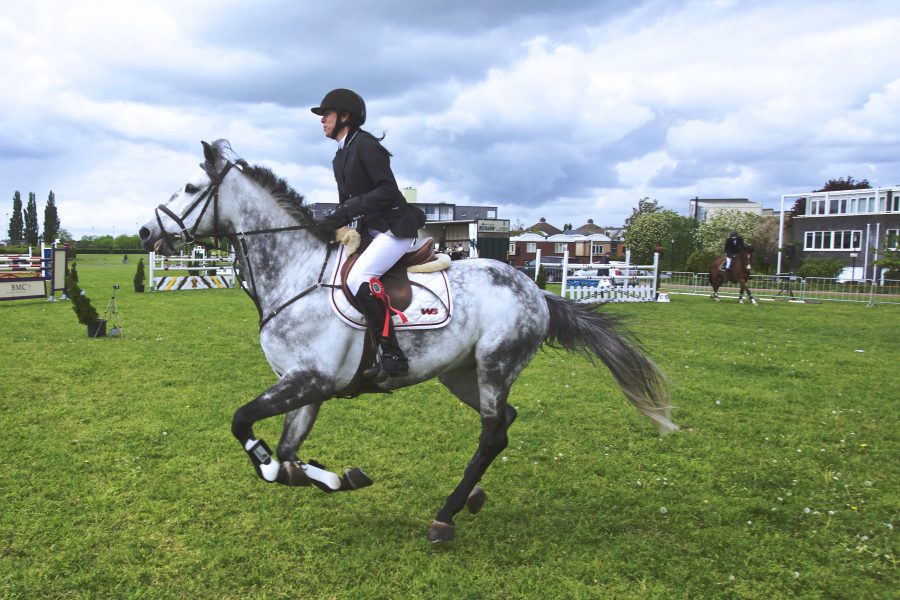
*This is a guest post.*
Research shows that interacting with animals can help promote healthy emotional development in children and adolescents, reduce stress and anxiety, and help develop strong emotional bonds. Nicky Ellis of Horses & Foals shares how riding horses can help kids improve focus and problem-solving abilities while providing good physical exercise. While not everyone has access to horse riding, volunteering at a local shelter or barn may be a good way to positively interact with animals and improve socio-emotional development.
Getting outdoors and playing in the open space has many benefits. Exposing children to the fresh air is good for their health. Taking in fresh air helps children improve their memory and keeps their minds active, which helps them be creative. Being under the warm sun helps increase children’s immunity. They are thus much stronger when fighting cases of flu and the common cold. Adding a sport such as horseback riding to their outdoor time gives children an incentive to spend more time away from technological gadgets.
An activity like horseback riding helps children put their core muscles to use. They also put their pelvic muscles and the muscles of the inner thighs to use in order to maintain steady balance while riding. Usage of this group of muscles helps children develop proper posture. It also helps children improve their flexibility, as well as muscle tone.
Horseback riding has as many benefits for children’s minds as it has for their bodies. Children learn to stay aware of their surroundings and stay alert. It is proven through research that horseback riding helps enhance cognition and aids in learning and memory functions. It improves their focus, as well as problem-solving abilities.
Introducing children to horses can be tricky. Not all children are likely to feel fearless when approaching a horse, as it is a big animal. However, if you have pets in your home or in the neighborhood, and your children feel comfortable being around those pets, then they might find it easier to bond with a horse.
Prior to deciding on investing money in enrollment at a horseback riding training facility, it would be advisable to first gauge how keen your child is about taking riding lessons. In order to pique their interest, you can read books to them or watch television shows/movies that involve horses or horseback riding. Their response will help you gauge if they would like to give it a try.
Here are the top three developmental benefits of horseback riding to help your child improve their focus.
- Better performance at school
- Improved problem-solving abilities
- Good work-out
Better performance at school
Studies have shown that children who engage in horseback riding have better cognitive abilities. Research has proved that horses emit certain vibrations when they are being ridden. These vibrations can activate the sympathetic nervous system in the human brain. This means, children’s ability to learn and retain information are strengthened and their focus is sharpened. The skills and attributes children acquire while learning horseback riding then spill over into their scholastic performance. These children are likely to be better prepared to take on academic tasks.
Improved problem-solving abilities
A mature horse is close to twice the size of a child. The temperament of horses is typically gentle. Despite this, due to the sheer size of the animal, children are likely to get scared of the horse. However, once they ride the horse, their confidence level is upped. They feel like they have accomplished something. The child has to figure out how to maintain their balance while riding and also guide the horse to walk on the track. This not only boosts their confidence but also enhances their problem-solving abilities.
Good work-out
As mentioned earlier, horseback riding is a great form of exercise for the mind and the body. Riding on a horseback helps the rider utilize their core muscles, pelvic muscles, and inner thigh muscles. Effective usage of these muscles is required to maintain a good balance while riding the horse and prevent falling off. The rider needs to be aware of the movement of the horse and adjust the position of their body to match the movements of the horse’s body. This requires complete focus.
Thus horseback riding, as leisurely as it may seem, can tire out the rider, both mentally and physically. When children engage in horseback riding, they are likely to sleep better due to the mental and physical work-out. Good sleep is vital to boost memory, improve focus, and increase attention span. Well-rested children tend to perform better in their academics.
Conclusion
Most horseback riding training facilities accept enrollment applications only for children above six to seven years old. The reason being that, by that age, the child achieves a height that is suitable for horseback riding. The child can be seated safely on the horse. Also, by that age, a child is more likely to be careful of their actions. They are also aware of the risks involved being in close proximity to a large animal.
How has interacting with animals helped your child?




I fully agree with this author. Horse riding is a great way to improve a child’s focus and confidence. Thanks for sharing.